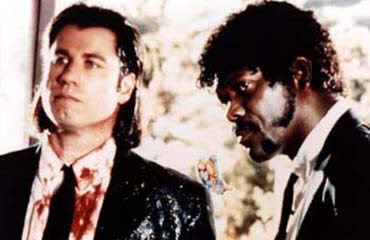Pulp Devotion

To what extent can back-and-forth discussion (i.e. the dialectic) help a person to discover their devotion?
In the film Pulp Fiction, two gangsters have a human corpse in their trunk. They go to their friend Jimmie's house to clean things up, and he happens to be home. The problem presents itself that the wife may return home from a long shift at the hospital and become displeased to find a dead body in the garage. Jimmie is disturbed by this prospect.
At this point Jules, one of the gangsters, decides to approach the situation dialectically with Jimmie ... as awkward as it might be. He starts by talking about the coffee. It's really great. Like gourmet great.
Jimmie sees that this dialectic manuever is merely a distraction:
I buy the gourmet expensive stuff 'cause when I drink it, I wanna taste it. But what's on my mind at this moment isn't the coffee in my kitchen, it's the dead black dude in my garage.
So here we are left with a question: is Jimmy in a state of inconsolable rage (inconsolable to the point that no dialectic can rescue him) or is it that the dialectic itself has become a distraction to the Good? Is there anything that could come up in the conversation that could reconcile the heart through the discourse interpreted by the brain? Jimmie does not leave us speculating on this question:
"There's nothin'you can say that's gonna make me forget I love my wife."
But Jimmy! How did you arrive at the conclusion that you love your wife? Can't we say something that will conflict with the reasons you have for loving your wife? Isn't your logic subject to external analysis?
No. Jimmy loves by the means of love. That is to say, the presupposition and conclusion are united in the paradox of faith. No external proof (in the form of good tasting coffee for example) presents itself to esteem the love he has for his wife. He will not have any such proof. In the silence of the world's justifications, Jimmy is left with his own voice ... and it's saying, "I love my wife!".
This conclusion is not a conclusion at all, but a resolution ... a resolution that longs to express itself the more Jimmy looks upon his own decisiveness in the moment by means of the absurd. Nothing implies imposes or implants this decisiveness upon Jimmy. He implies imposes and implants this decisiveness upon the world ... and it is precisely in this decisiveness that the proof lies.
And this is the only avenue to finding one's devotion.
Labels: Movies


0 Comments:
Post a Comment
<< Home